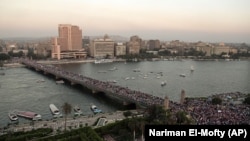WASHINGTON —
The United States has not announced any decisions yet on whether to cut—or amend—military aid to Egypt, but President Barack Obama has said whatever the decision, he doubts it will influence the military-backed government’s actions.
The U.S. gives Egypt $1.2 billion in military aid and $250 million in economic aid every year. But the amount of U.S. aid is relatively small compared to the more than $12 billion that Saudi Arabia and other Gulf monarchies are promising.
But like many foreign policy decisions, whether to continue providing U.S. aid will require a careful balancing of U.S. interests and human rights concerns.
The United States has a long-standing military relationship with Egypt and has always viewed that as a good investment, especially because the aid is directly linked to maintaining Egypt’s 1979 peace treaty with Israel.
Egypt also allows Washington to send U.S. Navy vessels through the Suez Canal on a priority basis and to fly from the Mediterranean across Egypt’s air space to the Red Sea and Persian Gulf. Analysts worry that if the U.S. cuts aid to Egypt, these concessions could change.
Aid benefits defense industry
There are other important considerations, says Robert Satloff, executive director of the Washington Institute for Near East Policy.
“$1.3 billion dollars is certainly not a lot in relative terms, in terms of the Egyptian GDP and in terms of what other countries are willing, at this moment, to substitute for Egypt,” he said.
But the aid is important because it has kept the Egyptians as a major customer for U.S. advanced weapons systems and continued training.
“There aren’t many places where the Egyptians can go shopping for these things,” Satloff said. “You need a deep and years-long partnership with a major power in order to procure such a weaponry and the training and technology that the Egyptians are looking for.”
Admittedly, says Satloff, the U.S. benefits in “a sort of mercenary way” because much of the aid money goes to America’s defense industry.
“But we benefit in a broader sense by being the indispensable partner to the most significant military force in the Arab world,” Satloff said. “And we benefit in a larger sense in that the partnership is a two-way street. I mean, the Egyptians do things for us and we do things for them.”
Satloff says the best course of action with regard to Egypt is to simply “do nothing” -- i.e., “maintain what leverage we have, maintain what connections we have, in the hope that they can, before long, be put to advance American interests more effectively.”
Subsidizing tyranny
Charles W. Dunne is director of Middle East and North Africa programs at Freedom House, one of several non-government organizations accused by Egypt of political interference. He has argued for months – most recently, before a House Foreign Affairs subcommittee in early June – that the Washington should suspend aid because of increased repression of civil society in Egypt.
“I think the case is even more powerful now that we are simply subsidizing tyranny, which is taking place in Egypt,” Dunne said. “People are being arrested en masse.
Emergency law has been reinstated.
The military is engaging in severe repression of human and civil rights, and I think the relationship as it has gone on for the last 30 years is simply unsustainable.”
Dunne admits that cutting aid carries political risks. Egypt’s military is unhappy enough over what it sees as Washington’s past support of the former government of ousted president Mohamed Morsi as well as Washington’s reluctance to endorse the military’s recent actions.
“But what people have to remember is that it’s fundamentally Egypt’s interest to keep that relationship going,” Dunne said. “It has no interest in shutting down the Suez Canal, which would be a political and economic disaster for Egypt. If it were to break off the treaty between Egypt and Israel -- (A), there is no way they can go to war against Israel, and (B), they would find a lot of their friends in the international community deserting them, not just the United States.”
What about using the U.S. aid as an incentive to promote further democratization?
“We are doing some of this already,” Dunne said. “Supporting their bid for an I.M.F. loan package, which the current government may be less interested in now with Saudi and other support flowing in.
“But they need U.S. support for international investors to come in. They need trade agreements. They need U.S. assurances that Egypt is a safe place to go as a tourist – that is a huge slice of their democratic economy,” Dunne said.
In the end, Dunne says the concerns about what the Egyptians might do if aid were canceled or reduced are overblown.
“I think they [the Egyptians] would be seeking ways to repair that relationship very quickly,” he concluded.
The U.S. gives Egypt $1.2 billion in military aid and $250 million in economic aid every year. But the amount of U.S. aid is relatively small compared to the more than $12 billion that Saudi Arabia and other Gulf monarchies are promising.
But like many foreign policy decisions, whether to continue providing U.S. aid will require a careful balancing of U.S. interests and human rights concerns.
The United States has a long-standing military relationship with Egypt and has always viewed that as a good investment, especially because the aid is directly linked to maintaining Egypt’s 1979 peace treaty with Israel.
Egypt also allows Washington to send U.S. Navy vessels through the Suez Canal on a priority basis and to fly from the Mediterranean across Egypt’s air space to the Red Sea and Persian Gulf. Analysts worry that if the U.S. cuts aid to Egypt, these concessions could change.
Aid benefits defense industry
There are other important considerations, says Robert Satloff, executive director of the Washington Institute for Near East Policy.
“$1.3 billion dollars is certainly not a lot in relative terms, in terms of the Egyptian GDP and in terms of what other countries are willing, at this moment, to substitute for Egypt,” he said.
But the aid is important because it has kept the Egyptians as a major customer for U.S. advanced weapons systems and continued training.
“There aren’t many places where the Egyptians can go shopping for these things,” Satloff said. “You need a deep and years-long partnership with a major power in order to procure such a weaponry and the training and technology that the Egyptians are looking for.”
Admittedly, says Satloff, the U.S. benefits in “a sort of mercenary way” because much of the aid money goes to America’s defense industry.
“But we benefit in a broader sense by being the indispensable partner to the most significant military force in the Arab world,” Satloff said. “And we benefit in a larger sense in that the partnership is a two-way street. I mean, the Egyptians do things for us and we do things for them.”
Satloff says the best course of action with regard to Egypt is to simply “do nothing” -- i.e., “maintain what leverage we have, maintain what connections we have, in the hope that they can, before long, be put to advance American interests more effectively.”
Subsidizing tyranny
Charles W. Dunne is director of Middle East and North Africa programs at Freedom House, one of several non-government organizations accused by Egypt of political interference. He has argued for months – most recently, before a House Foreign Affairs subcommittee in early June – that the Washington should suspend aid because of increased repression of civil society in Egypt.
“I think the case is even more powerful now that we are simply subsidizing tyranny, which is taking place in Egypt,” Dunne said. “People are being arrested en masse.
Emergency law has been reinstated.
The military is engaging in severe repression of human and civil rights, and I think the relationship as it has gone on for the last 30 years is simply unsustainable.”
Dunne admits that cutting aid carries political risks. Egypt’s military is unhappy enough over what it sees as Washington’s past support of the former government of ousted president Mohamed Morsi as well as Washington’s reluctance to endorse the military’s recent actions.
“But what people have to remember is that it’s fundamentally Egypt’s interest to keep that relationship going,” Dunne said. “It has no interest in shutting down the Suez Canal, which would be a political and economic disaster for Egypt. If it were to break off the treaty between Egypt and Israel -- (A), there is no way they can go to war against Israel, and (B), they would find a lot of their friends in the international community deserting them, not just the United States.”
What about using the U.S. aid as an incentive to promote further democratization?
“We are doing some of this already,” Dunne said. “Supporting their bid for an I.M.F. loan package, which the current government may be less interested in now with Saudi and other support flowing in.
“But they need U.S. support for international investors to come in. They need trade agreements. They need U.S. assurances that Egypt is a safe place to go as a tourist – that is a huge slice of their democratic economy,” Dunne said.
In the end, Dunne says the concerns about what the Egyptians might do if aid were canceled or reduced are overblown.
“I think they [the Egyptians] would be seeking ways to repair that relationship very quickly,” he concluded.






